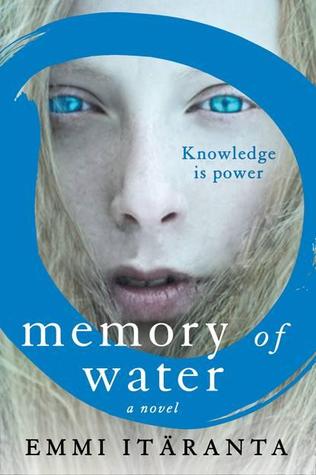Welcome to our stop on Memory Of Water tour for Emmi Itaranta. This tour is hosted by Me, My Shelf and I.
 Memory Of Water
Memory Of Water Author: Emmi Itaranta
Reading Level: Adult
Genre: Science Fiction
Released: June 10th 2014
Review Source: Harper Voyager


An amazing, award-winning speculative fiction debut novel by a major new talent, in the vein of Ursula K. Le Guin
Global warming has changed the world's geography and its politics. Wars are waged over water, and China rules Europe, including the Scandinavian Union, which is occupied by the power state of New Qian. In this far north place, seventeen-year-old Noria Kaitio is learning to become a tea master like her father, a position that holds great responsibility and great secrets. Tea masters alone know the location of hidden water sources, including the natural spring that Noria's father tends, which once provided water for her whole village.
But secrets do not stay hidden forever, and after her father's death the army starts watching their town-and Noria. And as water becomes even scarcer, Noria must choose between safety and striking out, between knowledge and kinship.
Imaginative and engaging, lyrical and poignant, Memory of Water is an indelible novel that portrays a future that is all too possible.
Excerpt from Chapter 4:
Where Noria, the main character, tries to imagine what winters used to be like before the world changed.
Where Noria, the main character, tries to imagine what winters used to be like before the world changed.
I had often tried to imagine how winters had been in the past-world.
I knew the darkness: every autumn around Moonfeast, night met day in order to swap places and the year turned towards winter. During the six twilight months, large blaze lanterns burned in each room of the house at all hours, and solar lamps were lit beside them in the ink-deep black of the evening. From the top of the fell one could see the glow of the cities in the dark skies: the distant but clear halo of Kuoloyarvi in the east, where the watering areas and the sea lay, and the near-invisible spark of Kuusamo far in the southern horizon. The ground lost its scant greenness. The garden waited for the return of the sun, mute and bare.
Imagining the coldness, on the other hand, was hard. I was used to wearing more layers of clothing during the dark season and carrying peat from the drained swamp for the fireplaces and braziers once the solar power ran out, usually soon after the Midwinter celebrations. But even then the temperature outside rarely dropped below ten degrees, and on warm days I walked in sandals, just like in summer.
When I’d been six years old, I had read in a past-world book about snow and ice, and asked my mother what they were. She had picked one of her thick and serious-looking volumes from a shelf that was too tall for me at the time, shown me the pictures – white, shimmering, round and sharp shapes in strange landscapes, luminous like crystallised light – and told me that they were water that had taken a different form in low temperatures, in circumstances that could only be artificially produced in our world but that had once been a natural part of seasons and people’s lives.
‘What happened to them?’ I had asked. ‘Why don’t we have snow and ice anymore?’
My mother had looked at me and yet through me, as if trying to see across thoughts and words and centuries, into winters long gone.
‘The world changed,’ she had said. ‘Most believe that it changed on its own, simply claimed its due. But a lot of knowledge was lost during the Twilight Century, and there are those who think that people changed the world, unintentionally or on purpose.’
‘What do you believe?’ I had asked.
She had remained quiet for a long time and said then, ‘I believe the world wouldn’t be what it is today if it wasn’t for people.’
In my imagination snow glowed with faint, white light, as if billions of blazeflies had dropped their wings, covering the ground with them. The darkness turned more transparent and lighter to bear in my mind when I thought of it against the silvery-white shimmer, and I longed for the past-world I had never known. I pictured fishfires flashing on the sky above radiant snow, and sometimes in my dreams lost winters shone brighter than summer.
I once did an experiment. I filled a bucket with water and emptied all the ice I found in the freezer into it, sneaked it into my room and locked the door. I pushed my hand into the icy wrap of water, closed my eyes and summoned the feel of past-world winters about which I had read so many stories. I called for white sheets of snow falling from the sky and covering the paths my feet knew, covering the house that held the memory of cold in its walls and foundations. I imagined the snowfall coating the fells, changing their craggy surfaces into landscapes as soft as sleep and as ready to drown you. I called for a glass-clear crust of ice to enclose the garden, to stay the greenness of the blades of grass and stall the water in barrels and
pipes. I imagined the sound frozen branches of trees would make, or stiff waterskins hanging from the rack, when wind beat them against each other.
I thought of water, ever-changing, and I thought of the suspended moment, the movement stopped in a snow crystal or a shard of ice. Stillness, silence. An end, or perhaps a beginning.
The blunt, heavy blade of the chilled slush cut into my bones. I opened my eyes. The day outside the window burned with a tall, bright flame, turning the earth slowly into dust and ashes. I pulled my hand out of the water. My skin was red and numb, and my fingers ached, but the rest of my body felt warm, and I was no closer to past-world winters.




















.png)










No comments:
Once Upon a Twilight
All rights reserved © 2010-2015
Custom Blog Design by Blogger Boutique
Post a Comment